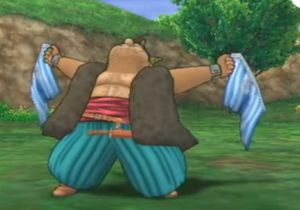Underpants Dance: Difference between revisions
From Dragon Quest Wiki
Tag: Rollback |
|||
| Line 14: | Line 14: | ||
===''[[Dragon Quest VIII]]''=== | ===''[[Dragon Quest VIII]]''=== | ||
[[Yangus]] can perform the Underpants Dance after allocating 55 skill points into his "Humanity" skill. It shares a similar relationship to [[War Cry]] as [[kasnooze]] does to [[snooze]]. Yangus is seen carrying two pairs of [[boxer shorts]] when he uses the ability in battle. [[Dancing devil]]s are also able to use the dance on the party, as well. | [[Yangus]] can perform the Underpants Dance after allocating 55 skill points into his "Humanity" skill. It shares a similar relationship to [[War Cry]] as [[kasnooze]] does to [[snooze]]. Yangus is seen carrying two pairs of [[boxer shorts]] when he uses the ability in battle. [[Dancing devil]]s, [[Tap devil]]s, and [[Caped caperer]]s are also able to use the dance on the party, as well. | ||
==Etymology== | ==Etymology== | ||
Latest revision as of 13:39, 16 April 2024
Underpants Dance is a recurring ability in the franchise. It may startle enemies with an outrageous dance performance.
Appearances[edit]
Dragon Quest VII[edit]
Underpants Dance is learned by the Gadabout vocation at the 6th rank. Sir Mervyn joins the party with the dance learned. Humorously, the Almighty is able to do the dance in battle, as well.
Dragon Quest VIII[edit]
Yangus can perform the Underpants Dance after allocating 55 skill points into his "Humanity" skill. It shares a similar relationship to War Cry as kasnooze does to snooze. Yangus is seen carrying two pairs of boxer shorts when he uses the ability in battle. Dancing devils, Tap devils, and Caped caperers are also able to use the dance on the party, as well.
Etymology[edit]
- In the original Japanese version, this skill is known as the Suteteko Dance. Suteteko or steteco pants are a type of loose cotton shorts similar to boxers worn by Japanese men that were introduced in 1881 as summer wear, designed to be worn underneath a kimono. They were named after a dance known as suteteko-odori from a song that men would sing while dancing in their underwear, possibly while intoxicated.
